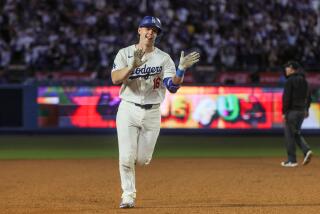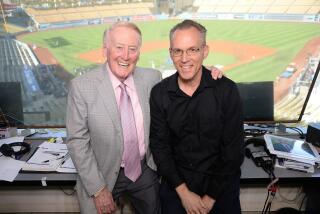Willard On Call at All Times : World Series Hero Plays Sparingly for Braves but Tends to Come Through in a Pinch
- Share via
Welcome to the weird yet wonderful world of Jerry Willard, pinch-hitter and bench sitter for the Atlanta Braves.
It is 6:37 p.m., less than one hour before game time, and Willard, dressed in his gray, red and blue road uniform, is visiting with fans while perched atop a camera well next to the first base dugout at Dodger Stadium.
“I don’t even know where some of them are,” he said, perusing a sea of sparsely populated seats in search of family and friends.
Willard, 32, a former Hueneme High and Oxnard College standout, has a pass list of close to two dozen, a sizable contingent, though roughly half the size of the one that rooted on the Braves during their pennant-winning drive last year.
Willard’s family and friends have come to watch him knowing full well that sightings are extremely rare.
On this night, as usual, Willard will not play.
Ostensibly, he is the Braves’ third-string catcher, but he has played the position only once this season, a two-inning stint against San Diego. “And I hit a home run that day too,” he is quick to add.
Truth be told, Willard can recall details from most of his game appearances. And for good reason.
He has played less than any other National League player who has spent the entire season on the active roster.
In the Braves’ 70 games, Willard has only 23 official at-bats. By comparison, Stan Javier, the Dodger with the fewest at-bats, has 55.
Willard is the most part time of players, but he certainly is not desperate for work. He is in the batting cage at 2:30 p.m.--five hours before game time and two hours before the team bus arrives at the stadium.
Afterward, he dons protective equipment and makes his way to the bullpen where he catches for pitchers throwing between starts and relievers trying to stay sharp. “I’m one of the few guys who doesn’t like off days,” Willard said during a brief respite between pregame chores. “Man, the next day, I’m swamped. I have five relievers and three starters who have to throw. By the time the game starts, I’m worn out.”
But Willard is not complaining. Rather, he is simply explaining. He has firsthand knowledge that being a bit player for the Braves is far more enjoyable--and profitable--than the alternatives.
Four years ago, having spent four years in the major leagues, he was a construction laborer who played in slow-pitch softball tournaments on weekends. His career appeared over.
Originally signed as a free agent by Philadelphia, Willard has played for four major league teams, his baseball odyssey having taken him from Cleveland to Oakland to Chicago to Atlanta, with numerous minor league stops between.
Once he was considered among the brightest catching prospects. In 1985, he batted .270 in 300 at-bats for Cleveland with seven home runs and 36 runs batted in.
But his fall came as quickly as his rise. The following spring, the Indians released him, saying they were committed to developing Andy Allanson, another young catcher.
Oakland signed Willard three days later, but the damage was done. He was a marked man, a 26-year-old who suddenly and inexplicably had been released by the worst team in baseball.
“To this day I don’t know why,” Willard said. “There is really no good reason. I’ve racked my brain wondering why. And I’m bitter. Very bitter.”
Injury was then added to insult. Willard sustained a herniated disk in his lower back while taking ground balls at third base before an Oakland game in 1987. Shortly after that season, he was released again. And this time he figured it was for good.
“I wasn’t sure I even wanted to come back,” he said. “I’d seen too many guys try to come back and never make it. It just seemed like you wouldn’t ever get a real chance.”
Willard came home to Ventura County and spent most of 1988 working first in construction and then at an athletic club. The long hours, starting at dawn, didn’t faze him. It was the weekends that drove him crazy. “There was nothing to do,” Willard said. “I was bored.”
He tried slow-pitch softball, playing shortstop for a top traveling team.
“It was fun,” he said. “But I just couldn’t get baseball out of my system. I’m watching games on TV and saying, ‘Wow, I can do that. I can do better than that!’ ”
So he set out to prove it, enlisting the help of Kevin Jacobson, a longtime friend who was a sports agent. In February, 1989, Willard signed with the Chicago White Sox, who assigned him to triple-A Vancouver where he played most of the following two seasons.
He rebounded from the layoff by batting .276 with seven home runs and 38 RBIs. Then, in 1990, he batted .279 with 20 home runs and 76 RBIs, earning a September promotion to the White Sox.
Unfortunately for Willard, Chicago already had two proven catchers, Carlton Fisk and Ron Karkovice. But with six years of minor league experience, he earned free-agent status and signed with the Braves after the 1990 season.
Willard was shuffled between Atlanta and triple-A Richmond three times last season. He appeared in only 17 games for the Braves, batting .214, but he earned a spot on the team’s active roster for postseason play.
And he paid dividends. Willard appeared as a pinch-hitter in Game 4 of the World Series against the Twins, bringing home Mark Lemke with a ninth-inning sacrifice fly that gave the Braves a 3-2 victory.
What followed, Willard says, was “one big media party.”
“I’ve never had so much attention,” Willard said, recalling the postgame press conference at which he and Lemke were seated before hundreds of reporters and cameras. “It was like I was running for the presidency or something.”
Since then, his moments in the spotlight have been few and far between.
Though Willard has made the most of his few chances this season, batting .348 with two homers and seven RBIs, Greg Olson and Damon Berryhill still are the Braves’ top catchers.
“The hardest part isn’t waiting for my time to hit,” Willard said. “It’s what happens after. When I’m done hitting, I’m done for the game and that still just doesn’t feel right. I’m wired, I’m pumped and I’m ready to go nine.”
The Braves say they wouldn’t have it any other way. “You don’t ever want a guy sitting on the bench who doesn’t want to play,” hitting coach Clarence Jones said. “Jerry is the kind of guy who wants to get in there every day and show the world he can hit.”
Braves first base coach Pat Corrales, Willard’s former manager at Cleveland, said Willard is an “adequate” catcher whose “real forte is hitting.”
“And he knows it,” Corrales added. “And that’s three-fourths of the battle right there.”
The night’s lineup card, posted in the team’s clubhouse, is proof positive that Willard is valuable even in his limited role.
Listed below the team’s starting lineup are the Braves’ pinch-hitters. There are four names on the right side, one in the middle--switch-hitter Otis Nixon--and only one on the left: Willard, the club’s only natural left-handed hitter off the bench.
On this night, his services aren’t required. But a week later, on June 16 in Atlanta, he is called on to pinch-hit and delivers a game-tying single off the Dodgers’ Jim Gott. The Braves go on to win.
“I know they need me,” Willard said, “and that’s a good feeling. My job is to hit right now and if the opportunity comes for me to catch, then I’ll be ready to go.”
He is happy, but still not content.
“Every day I hope they’ll say, ‘Let’s throw a little thunder out there. Let’s give this guy a chance behind the plate,’ ” he said.
He realizes his situation could be worse. The other day, an old softball-playing buddy visited him before a game.
“He said, ‘We need you back at shortstop,’ ” Willard recalled. “I said, ‘Yeah, right. If you can match my contract now, with a five-year guarantee, you’ve got it.’ ”
More to Read
Go beyond the scoreboard
Get the latest on L.A.'s teams in the daily Sports Report newsletter.
You may occasionally receive promotional content from the Los Angeles Times.











